I m a Feng Shui Expert—Here s How To Optimize Your Bedroom
According to feng shui principles, mirrors have the ability to activate the energy within a room, yet the most important thing is to test this for yourself because every person is different, says Cerrano. “Clients I work with will sometimes choose to keep a mirror in their bedroom and tell me that they sleep soundly. Others will negotiate the principle and remove extra mirrors and still keep one while being mindful of what it reflects. Some clients love the idea of no mirrors in the bedroom or may just place a long mirror inside the closet door.” If you do that, Cerrano adds, “just make sure the closet is organized because mirrors double what they project.”
13 Feng Shui Bedroom Tips to Help You Sleep Better
Feng Shui uses interior design to achieve balance and happiness in your space, and in this philosophy the bedroom holds paramount significance as the cornerstone of the home.
If you want to combat negative energy and bring joy to your sanctuary, join us as we share our expert tips that will guide you in creating a blissful Feng Shui bedroom for better Zzzs.
The ideal Feng Shui bedroom layout
There are many levels of Feng Shui expertise, as it takes years of study to master. Here are some basic Feng Shui fundamentals you can implement right away:
- Make your bed accessible from each side
- Have two bedside tables
- Avoid the bed being directly in line with the door
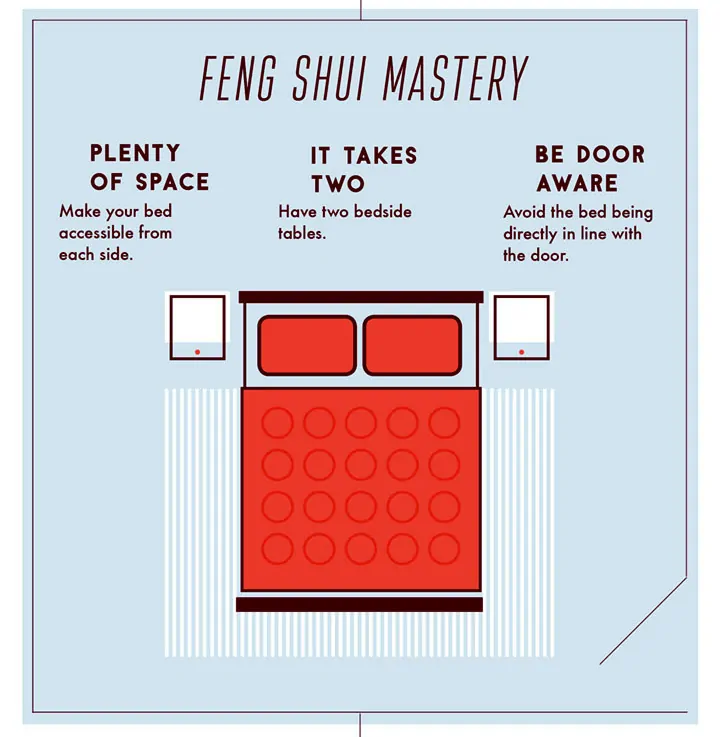
What is Feng Shui?
Feng Shui is a philosophy based on the ancient Chinese system of natural laws, which are supposed to govern the spatial arrangement orientation of your furniture and décor in relation to the flow of energy (Chi). The word ‘feng’ is Chinese for wind, and the word ‘shui’ is Chinese for water. Together, these symbolise the flow of life that one should aspire to have in one’s home.
Contemporary Feng Shui developed in Western society in the 1970s. It is based on the psychology of how to achieve goals through a targeted focus on the different aspects of life as well as the classical form of Feng Shui principles, which included Chi flow and the manifestations of Yin and Yang.
We’ve compiled a list of Feng Shui tips to ensure your energy flows in the right direction and help you achieve a good night sleep:
13 tips to achieve a Feng Shui bedroom
- Position your bed centrally
- Invest in a king or super-king size bed and mattress
- Avoid mirrors within the sight-line of the bed
- Maximise airflow with adjustable blinds
- Limit electronic devices and screens
- Ensure your bed has a bedside table on either side
- Use natural bedding and eco-friendly materials
- Choose soothing, muted colour tones
- Use candles and low-light bulbs
- Keep all drawers and doors closed when not in use
- Invest in a solid headboard
- Move your bookshelf to a different room
- Only have books you’re currently reading in your bedroom
Let’s explore each tip in more detail…
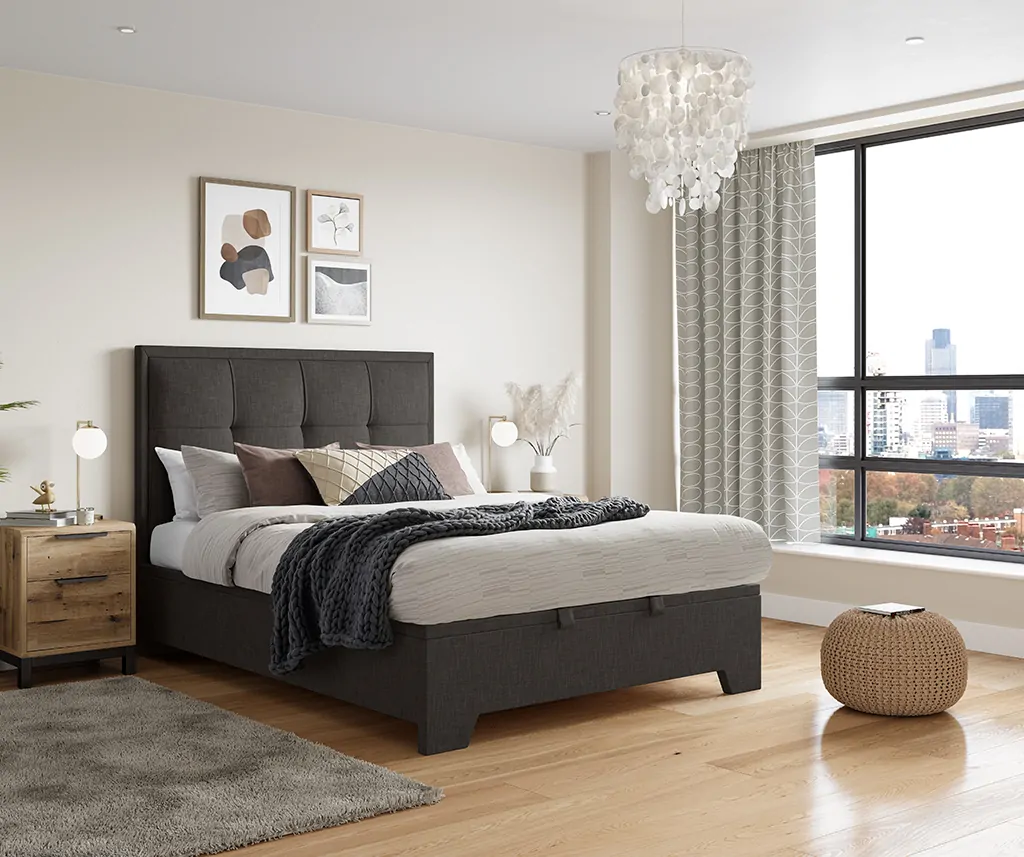
1. Position your bed centrally
A Feng Shui fundamental is the concept of the “commanding position”, which refers to placing objects facing the entry door but not in line with it. In bedroom Feng Shui, your bed should be placed in the commanding position as it is the most important item in that room and where you will spend most of your time. The best place to position your bed is diagonally from the door, so it is in your sight, but you do not look directly out of it.
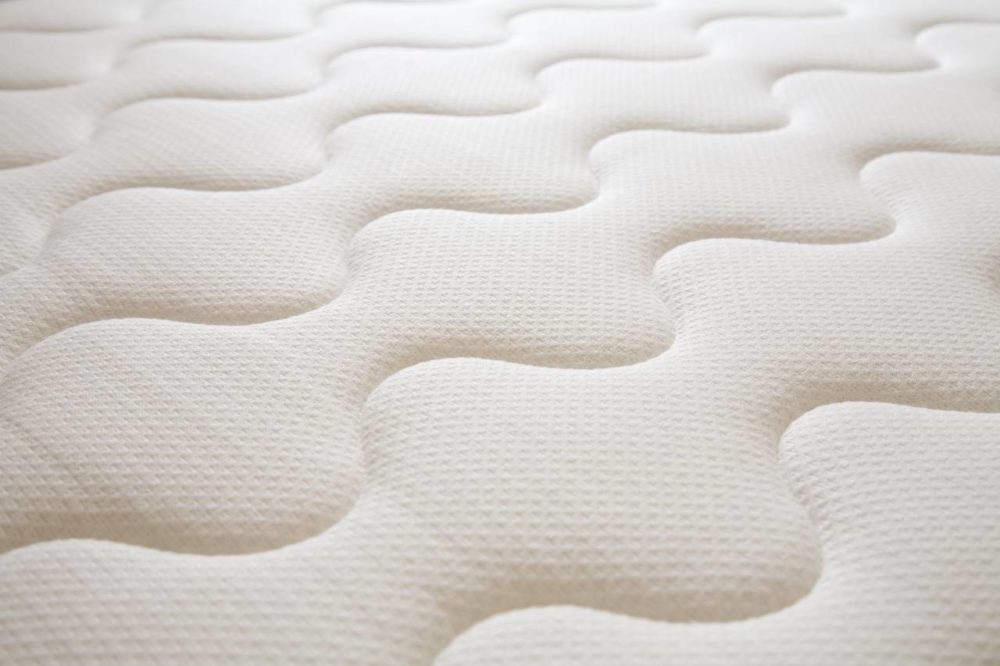
2. Invest in a king or super-king size bed and mattress
Feng Shui is all about the interaction of humans and the environments in which they spend their time. As a big portion of that is where we sleep, it’s safe to assume that incorporating Feng Shui into our bedroom is a good way to achieve a more balanced life. Super king beds are ideal if you have a room that’s big enough. That’s because they give us the maximum space in which to relax and turn off from the distractions of the modern world.
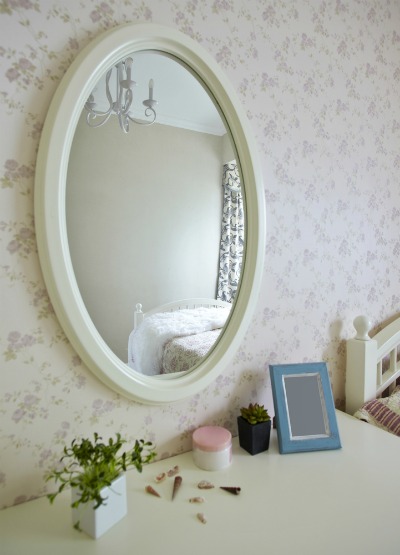
3. Avoid mirrors in the sight line of your bed
While mirrors are great for making a small room look bigger, mirror placement can be difficult when implementing bedroom Feng Shui. It is most important is to ensure your mirrors aren’t in line with the bed as this will likely bring more distracting elements into your sightline. This doesn’t mean mirrors are a no-go for a high-Chi bedroom. Try to make sure that you can’t see yourself from bed and the mirror does not face out of the door – try a higher mirror for a good sense of balance.
A good idea is to place them opposite a window, this will help maximise light in your room without distracting you when trying to relax from your bed.
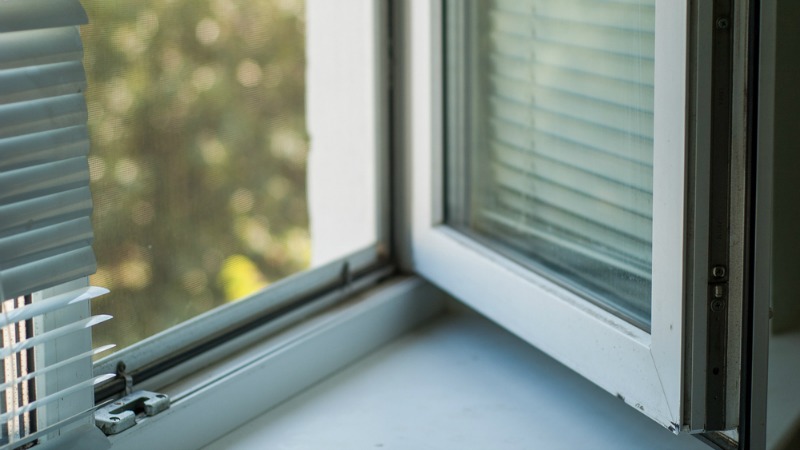
4. Maximise air-flow with adjustable blinds
Nature is a key component of a Feng Shui bedroom, and an easy way to incorporate the natural world is to ensure maximum airflow. This will not only keep your bedroom fresh and clean but will help aid in better sleep.
A study published in the journal Indoor Air found that sleeping in well-ventilated rooms, whether through an open window or open door, led to enhanced sleep quality, reduced nighttime awakenings, and lower carbon dioxide levels. As the levels of carbon dioxide decreased, individuals experienced deeper and more uninterrupted sleep.

5. Limit electronic devices and screens
Blue light is one of the worst offenders when it comes to preventing sleep. But when it comes to creating the right levels of yin and yang in your bedroom, it goes beyond simply the fact that technology disrupts our circadian rhythms. As Feng Shui centres around the natural world, anything technological or man-made can reduce the level of Chi in our environment and therefore start to disrupt our sleep and relaxation.
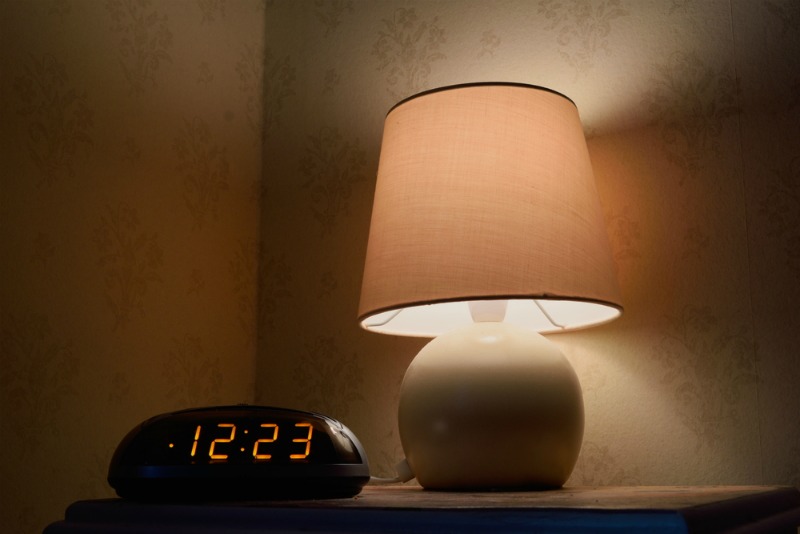
6. Ensure your bed has a bedside table on either side
Balance is extremely important in bedroom Feng Shui, and an easy way to create symmetry and balance is through bedside tables. Place one on either side of your bed, and your bedroom will start to feel harmonious and achieve a greater level of Chi. Place a bedroom plant on each side unit, and you’ll maximise the natural essence of your bedroom Feng Shui too.
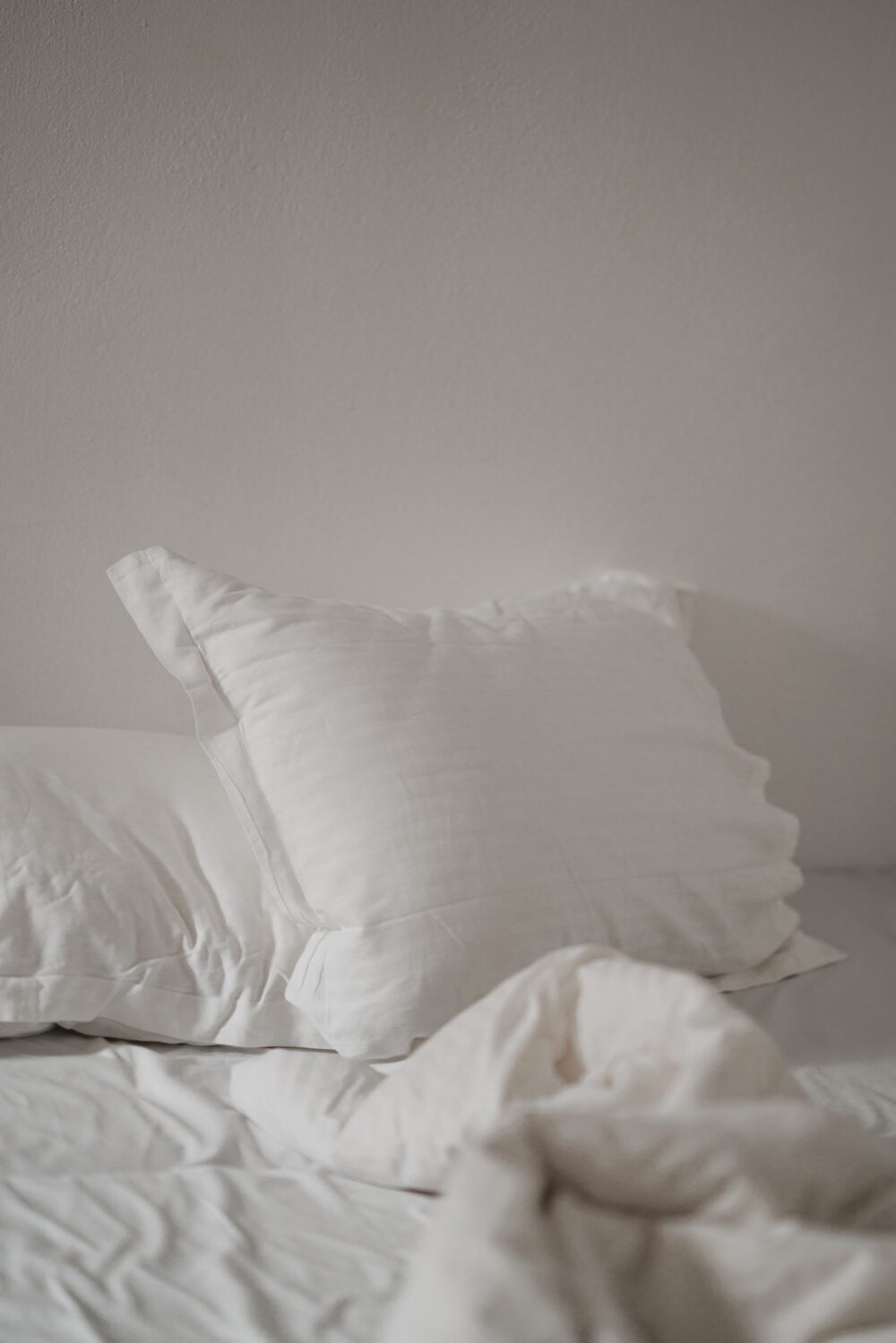
7. Use natural bedding and eco-friendly materials
Another way to incorporate natural elements into your bedroom is through the use of natural bedding. Look for natural mattresses that use bamboo or cotton to help reduce the amount of synthetic material in your sleeping space. These aren’t just great for improving the levels of Feng Shui in your master suite but are also ideal for temperature regulation as natural materials wick moisture better than their non-natural counterparts.
Get more advice on what to wear to bed for a good night’s sleep.
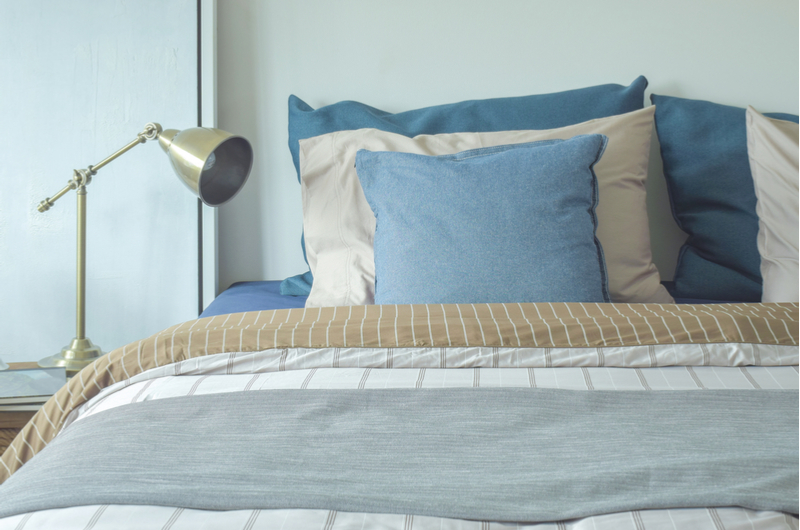
8. Choose soothing, muted colour tones
Sleep relaxation is best achieved when there’s nothing in the bedroom design that stands out or draws too much attention. To achieve this sense of balance, which is also a key part of Feng Shui, choose colours and patterns which are muted and soothing. Pastel tones are great here. Soothing blues, pinks and greens work well to create a harmonious, distraction-free boudoir.

9. Use candles and low-light bulbs
Go one step further than a muted colour scheme with the use of low-light bulbs and mood lighting. This will help create a relaxing ambiance in your bedroom and provide that sense of calm and quiet that’s so important to a great night’s sleep. It’ll also help create a sense of balance within your room, once again improving the all-important levels of Chi throughout.
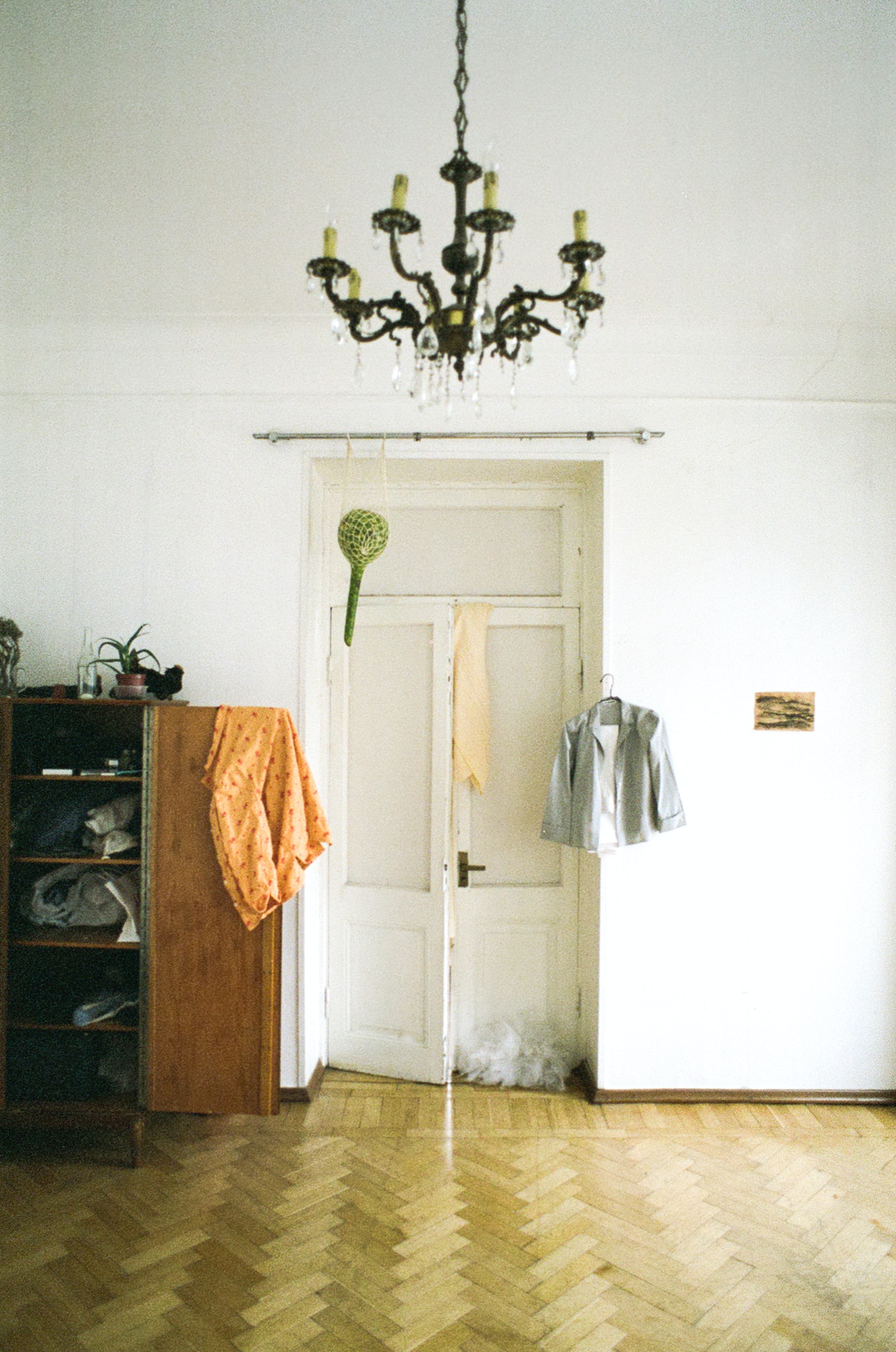
10. Keep all drawers and doors closed when not in use
To achieve a bedroom with good Feng Shui, it’s important to limit all distractions. Ensuring you keep drawers and wardrobe doors closed will help limit distractions when you’re trying to sleep or relax before bed. So, even if, after a long day, you jump straight into bed and realise your wardrobe is slightly open, it’s best to get out and close it before you try to nod off. Trust us, you’ll fall asleep faster – even if your brain is telling you you’re ready for bed and too comfortable to move.
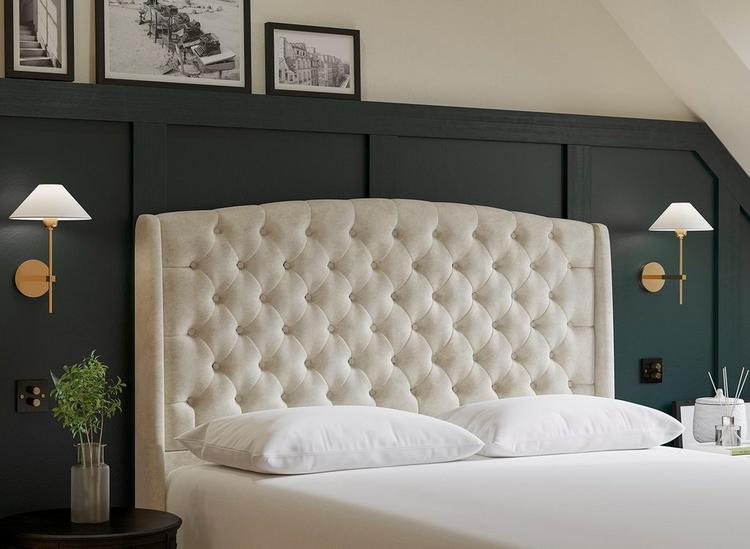
11. Invest in a solid headboard
A solid headboard will help increase symmetry and balance in your bedroom. But it will also make it much more comfortable to sit up in bed and read a book while you soak up your essential oils for sleep. Remember to choose one that doesn’t disrupt the balance of your existing decor, and you’ll be nodding off in no time at all.
12. Move your bookshelf to a different room
Perhaps difficult for bookworms and literary enthusiasts, but books are just another form of distraction when trying to sleep. They’re also friends for collecting dust and disrupting the balance in your bedroom, so try to keep them in a study or spare room and only keep the one you’re reading at the time in reaching distance.
13. Only have books you’re currently reading in your bedroom
Expanding on the previous point, it’s best to keep only the book you’re reading in your bedroom. This will help to minimise disruption as you try to sleep. We’ve all been at that point in a book where we think we might swap it for another, but this won’t help your mind turn off while you’re getting ready for bed. Best to continue with the one you’ve started or at least leave the change until the next day.
Tips and thoughts from a Feng Shui master
Feng Shui master consultant Alan Stirling says:
‘You can sleep under a window as long as there is some wall, and you can draw the curtains behind you. This then simulates a solid wall. However, you should never sleep against a floor to ceiling window.
In addition to the ‘command’ location of your bed, you also need something taller on the left-hand side when lying in bed, and something smaller on the right. This emulates the way that energy flows around the body; as well as the movement of Sun and Moon on our planet, when standing or sleeping with our back to the magnetic fields (north pole).
Mirrors are a big problem as you should never be able to see yourself when lying in bed. Your subconscious is aware of the reflection which will only produce a fitful sleep at best. Just move or cover the mirrors at night with fabric or a curtain.
By far the best way of getting a good night’s rest is to sleep in a favourable direction and I have seen many life’s transformed from just realigning the bed.
My Feng Shui site has the formula that helps you find your best direction for either prosperity, sleep, health family harmony or long life. You can also add favourable colours and our site tells you how to do this too.’
Feng Shui bedroom mistakes to avoid
When it comes to creating a harmonious and balanced Feng Shui bedroom, as previously mentioned, there are certain things that you should steer clear of…
- Clutter chaos: Clutter is the archenemy of good Feng Shui. Avoid letting unnecessary items accumulate in your bedroom. Keep surfaces clean and tidy, allowing the energy to flow freely and creating a calming atmosphere that supports relaxation.
- Disruptive electronics: Electronics, such as televisions, computers, and exercise equipment, emit electromagnetic fields that can interfere with the tranquillity of your sleep space. Minimise their presence or keep them out of your room entirely. If you must have electronics, ensure they are switched off during sleep.
- Mirror mayhem: While mirrors can be helpful in your bedroom, placing them inappropriately can disrupt energy flow. Avoid positioning them directly facing the bed, as they can create a sense of restlessness and hinder your quality of slumber. If you must have a mirror in your room, use curtains to cover them at night.
- Overwhelming colours: Vibrant and stimulating colours may energise your space but are not conducive to a soothing bedroom environment. Avoid overly bright or intense hues. Instead, opt for calming, muted tones like warm neutrals.
- Poor bed placement: The placement of your bed is crucial in Feng Shui. Avoid positioning your bed directly in line with your door or against your walls. Make sure you leave space around it.
Feng Shui bedroom colour and art tips
For your bedroom walls and art, use soothing natural colours such as ‘skin colours’ – these vary from pale white to rich chocolate brown.
Below is a helpful colour wheel that demonstrates the Feng Shui relationship between colour and mood.
In Feng Shui, when a practitioner refers to a colour chart, they generally are referring to the colours associated with each life area of the Bagua, or Pakua. In addition to the specific life areas and colours, each of the nine sections of the Pakua also has a corresponding element and direction.
I’m a Feng Shui Expert—Here’s How To Optimize Your Bedroom
:max_bytes(150000):strip_icc()/cdn.cliqueinc.com__cache__users__608__gabrielle-savoie-608-1479741785-main_image-65573ce927194542b589af61c2fe1cef.jpg)
Gabrielle Savoie is the founder of décor site Savvy Home, a finalist for prestigious style and design awards. She is an expert in interior design and home décor and has been a writer and editor for various high-profile publications in the industry for almost 10 years.
Nikki Elmwood is a fact-checker, editor, and proofreader with over six years of fact-checking experience. She received a Bachelor of Science from Portland State University. Nikki has expertise in the areas of design, art, and architecture.
:max_bytes(150000):strip_icc()/studioashby-251edcbe20d041a68662adbad957c971.png)
Feng shui, an ancient Chinese perspective rooted in the belief that everything (including the arrangement of a room, like your bedroom) possesses energy, is a little like astrology. Whether you believe in it or not, learning its inner workings and understanding how it can impact your everyday life is somewhat fascinating. As it relates to home decorating, the right feng shui is believed to balance the energy that flows into and around your space and can have an impact on our wellbeing, relationships, and even our wallets.
Whether we’re talking new moons and planet alignments or bedroom colors and under-bed storage, the link between environment and energy is an abstract concept—but that doesn’t mean that its concrete implications in everyday life need to be confusing as well.
When it comes to arranging your bedroom, for example, feng shui consultants won’t demand you float your bed at a weird angle in the middle of the room and paint your walls four different colors (at least, not the ones we spoke to). Instead, feng shui principles are malleable. “Principles are meant to be flexible, which allows the mind more room for creative solutions when needed,” says New York-based feng shui consultant Laura Cerrano.
Meet the Expert
After studying with some of the finest masters in feng shui and shamanism, Laura Cerrano received her Feng Shui Certification under the guidance of her mother and mentor, Certified Feng Shui Master Carole Provenzale, in 2000.
There’s another reason to adopt feng shui principles, especially in the bedroom: According to feng shui, how you position your furniture can actually impact your sleep—something we could frankly all use a little more of. Not convinced? Try out a few of these nine feng shui practices, plus 11 more tips, and tell us how you slept.
Create Symmetry
:strip_icc()/cdn.cliqueinc.com__cache__posts__222765__-222765-1493392609702-image.700x0c-e3450bbbad1f469d8078f5776751ffac.jpg)
One of the most important things in laying out your bedroom is to leave equal room on both sides of the bed. “This is symbolic of creating equal space for both you and your partner,” explains Cerrano. “Sometimes the dimensions of a bedroom don’t allow for this arrangement, so holding the intention of creating space is essential. Even if you could only spare an inch of space between the wall and bed, it’s better than nothing.”
For balance, try placing two side tables and two lamps in your bedroom—one side table and one lamp on each side of the bed. Plus, symmetry is pleasing to the eye.
Establish a Commanding Position
:strip_icc()/cdn.cliqueinc.com__cache__posts__222765__-222765-1493392612127-image.700x0c-228d6f0a447d4484b821ea7303d4f032.jpg)
“The most common feng shui principle in the bedroom is to have a commanding position,” says Cerrano. This means positioning your bed with a clear vantage point of the bedroom door from the bed while avoiding being 100 percent in alignment with the doorway, Cerrano says.
The result? “This allows the occupant to literally, energetically, and metaphorically see and feel who and what opportunities are approaching their life.”
The same goes for the ensuite bath, says Cerrano. “If you have a primary bathroom connected to your bedroom, you would also want to avoid placing your bed in direct alignment with the bathroom door.”
The term “Primary Bathroom” is now widely used to describe the largest bathroom in the home, as it better reflects the space’s purpose. Many realtors, architects, interior designers, and the Real Estate Standards Association have recognized the potentially discriminatory connotations in the term “Master.” Read more about our Diversity and Inclusion Pledge.
Adopt a Less-Is-More Approach
:strip_icc()/cdn.cliqueinc.com__cache__posts__222765__-222765-1493392611593-image.700x0c-2e61bdb0e85842b98d10fed733eff617.jpg)
It might be tempting to treat your bedroom as a storage unit, but Cerrano warns against filling it with too much stuff. In fact, Harvard Medical School recommends minimizing clutter in the bedroom environment to improve sleep quality, which in turn promotes better health and aging well.
Limit the Number of Mirrors
:strip_icc()/cdn.cliqueinc.com__cache__posts__222765__-222765-1493392610633-image.700x0c-694f324bb0a54421b8d9586aa061c892.jpg)
Mirrors in the bedroom can seem like a natural fit for many, but feng shui warns against overusing them: “There are varying thoughts on this, but the one perspective many consultants agree upon is that adding too many mirrors in the bedroom creates an imbalance of energy,” says Cerrano.
According to feng shui principles, mirrors have the ability to activate the energy within a room, yet the most important thing is to test this for yourself because every person is different, says Cerrano. “Clients I work with will sometimes choose to keep a mirror in their bedroom and tell me that they sleep soundly. Others will negotiate the principle and remove extra mirrors and still keep one while being mindful of what it reflects. Some clients love the idea of no mirrors in the bedroom or may just place a long mirror inside the closet door.” If you do that, Cerrano adds, “just make sure the closet is organized because mirrors double what they project.”
Ground the Space With a Rug
:strip_icc()/cdn.cliqueinc.com__cache__posts__222765__-222765-1493392611812-image.700x0c-1caad07c49df4bed94432c7d10a2bd74.jpg)
People sometimes avoid rugs in the bedroom because larger-scale ones can be expensive, but Cerrano insists it’s a worthwhile investment for your sleep: “Adding an area rug under or near the bed is another way to help ground the energy when sleeping and create a balance between yin (soft textures) and yang (hard surfaces).” Having two smaller rugs on each side can achieve a similar effect without the costly price tag.
Avoid Under-Bed Storage
:strip_icc()/cdn.cliqueinc.com__cache__posts__222765__-222765-1493392613463-image.700x0c-3c4a4cfabff6469aa026765522fa244c.jpg)
A common place for storage in the bedroom is usually under the bed, but Cerrano believes it’s not good practice: “From a feng shui perspective, storage under the bed can obstruct your sleeping pattern because the movement of energy cannot flow evenly around the energy fields of your bed.” For example, Cerrano suggests storing shoes in closets because otherwise, “they symbolize other people potentially taking advantage of you.”
The feng shui consultant recognizes that it’s not always possible to leave the area under the bed completely clutter-free: “If you do need to store items under the bed, be mindful of who gave these items to you and what emotional content you associate with them.” She adds that some items—specifically bedding, clothing, and towels—are better to store under the bed than others. A small number of books is also acceptable, as long as their titles and content are positive.
Always Make Your Bed
:strip_icc()/cdn.cliqueinc.com__cache__posts__222765__-222765-1493392614297-image.700x0c-1f9dbcc3b99c479da56d7b2684fdb48c.jpg)
This practice speaks more to everyday habits than layout or décor, but Cerrano stresses that it’s nonetheless important: “Making your bed may seem small and insignificant, yet a greater development within your conscious and subconscious minds is evolving. This simple act becomes your first accomplishment of the day and it only requires two minutes of your time.“
Making the bed every morning can kickstart an organized mindset, which helps reduce stress and increase motivation, Cerrano says. “It’s also a means of self-respect because it means you’ve taken the time to prepare your bed for sleep as your mom or dad may have done during childhood. It’s a little slice of self-love.”
Open Your Blinds Every Day
:strip_icc()/cdn.cliqueinc.com__cache__posts__222765__-222765-1493392613158-image.700x0c-f0e90f82e2c84330939898c0ae14bb5a.jpg)
Just like making your bed in the morning, opening your blinds before you head out for work may not be ingrained in your daily rituals, but it should be: “Opening your blinds and your windows (if weather permits) during the day is a wonderful habit to acquire,” says Cerrano.
“This is called letting the outside in. It helps to refresh the energy by allowing natural light and fresh air to filter into your bedroom. At night, close the windows and blinds as to keep the fresh energy circulating inside your bedroom when sleeping.” Even if you won’t be there to enjoy the natural light, let it stream in while you’re at work (just don’t leave your windows open and unattended—burglary is never good for feng shui).
Keep Colors Neutral
:strip_icc()/cdn.cliqueinc.com__cache__posts__222765__-222765-1493392612879-image.700x0c-902abd15dea944ea9593a26c535e9887.jpg)
You may be inclined to go bright green in a bedroom, but Cerrano advises against it if you’re considering feng shui principles. Instead, “pick neutral colors when painting large walls to not overstimulate the energy when you are sleeping. This could include beiges, cream colors, and earth tones. You could even include some cool blue tones. For smaller accent colors, pick colors associated with partnership energy: Pinks, reds, and whites. This could be implemented through artwork, small crystals (like rose quartz), organic candles, or bed sheets.”
The goal is to create a sacred and sensual space for yourself and to share with another—if that is your intention, says Cerrano. “The addition of certain feng shui colors is just one way to assist in the atmospheric rendering of good feng shui.”
Keep the Bed Away From the Bathroom Door
:strip_icc()/ScreenShot2019-09-19at1.53.52PM-d2df667755574304a8afe76d0c7f3ba0.png)
Don’t align your bed directly with the bathroom door. Some feng shui consultants will say the bathroom is associated with energy drain, and suggest avoiding positioning your bed this way.
Minimize Technology
:strip_icc()/kaboompics_Anornamentalgoldenplantinajarbythebedwithwhitesheetsandalaptop-cc3ab0e2aa234fe7ba4aae86c5a9986f.jpg)
Similarly, “feng shui principles invite you to remove electronics from inside the bedroom: TVs, computers, and cell phones emit the largest amounts of electric and magnetic fields, which could disturb your immune system and sleep,” explains Cerrano.
The same goes for work-related gadgetry and papers, Cerrano says. “The bedroom is a place for rest, rejuvenation, and reconnection. Space can be tight, especially in studios and one-bedroom apartments, but if you can create a work area in your home that is away from the bedroom, it will help improve your quality of sleep.”
Bring the Outside In (or Not)
:strip_icc()/ScreenShot2019-09-19at1.39.38PM-09f51234fd47451c9e5ef98d2ba3ca43.png)
Feng shui experts are divided on plants in the bedroom. Some say plants (including other wooden accents) contain too much energetic yang energy, while others say a large bedroom can accommodate a small plant or a single palm.
Balance All Five Elements
:strip_icc()/ScreenShot2019-09-19at2.03.39PM-f40895f1244f4d05a20008ce7614baa8.png)
Elements of wood, fire, metal, earth, and water should all be represented equally for good feng shui. Express these elements through your bedroom’s color palette, textures, shapes, and decorative objects.
Add a Supportive Headboard
:strip_icc()/ScreenShot2019-09-19at3.13.52PM-336d4b4166ab4322bca2a79c69042e58.png)
In feng shui, a headboard symbolizes support. Just make sure it’s securely attached and opt for soft edges (and avoid activating materials like iron) when possible.
Be Mindful of What You Hang Overhead
:strip_icc()/ScreenShot2019-09-19at2.45.07PM-c6534326836747dca5032ddf9a85b8bc.png)
Avoid inviting threatening energy into the bedroom by keeping the space directly above your head free and clear. Or at least choose artwork made from softer material or a piece that features a soothing pattern.
Nourish the Senses
:strip_icc()/kaboompics_Croissantsandfigsonagreenplateacupofcoffeeandacandle-483d5d4ee66c4d7f9d0ae642e0422bd4.jpg)
When accessorizing your bedroom, think about appealing to the five senses: touch, sight, smell, sound, and taste. Think feel-good textiles, a vanilla-scented candle, a jar of water nearby, and maybe even a white noise machine or a soothing bedtime playlist.
Watch Out for Sharp Corners
:strip_icc()/AnneSage-ac75d936d1d04f27a364b6878db1551e.jpg)
Evaluate your bedroom for any sharp or protruding corners, and if needed, reposition your furniture so these corners aren’t pointing directly at your head.
Assess Your Furniture
:strip_icc()/ScreenShot2019-09-19at1.29.59PM-fae4647bedfd4beebdc008c7989cd47e.png)
Tall, looming pieces of furniture have a tendency to give off constrictive energy in the bedroom. Feng shui experts recommend keeping these pieces, like bookshelves, outside of the bedroom.
Avoid Water Features
:strip_icc()/ScreenShot2019-09-20at3.07.54PM-09c394bb483043659f5bf2ca111ffef1.png)
While water elements can improve good feng shui in the home, features like fountains, artwork depicting oceans, rivers, etc. should also be kept outside of the bedroom—they give off too much energetic yang energy.
Invest in a Full or Queen Bed
:strip_icc()/ScreenShot2019-09-20at3.12.33PM-4149dc8fc88243c2a03a60ab8a9c543d.png)
If possible, feng shui experts recommend investing in a full-sized bed or larger. Any smaller and the chi won’t circulate as smoothly in the room.
MyDomaine uses only high-quality, trusted sources, including peer-reviewed studies, to support the facts within our articles. Read our editorial guidelines to learn more about how we keep our content accurate, reliable and trustworthy.